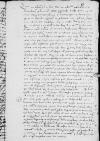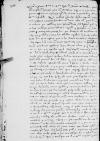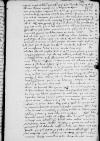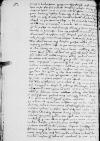Accepi superioribus diebus Dominationis Vestrae Reverendissimae binas easque humanissimas et favoris erga me plenas litteras, quibus ut in compendio respondeam, ne prolixitate mea, quam vix contrahere potero, iterum sim molestior omnemque quam possum daturus sum operam. Quod in ⌊⌋ XXII Aprilis ⌊Vilnae⌋ datis Dominatio Vestra Reverendissima scribit tam longam meam epistolam non iniucundam fuisse, veterem illum erga me amorem suum testatur, maxime autem quod institutum meum ad sacras litteras non improbat. Utinam illa in me agnoscerem, quae mihi Dominatio Vestra Reverendissima optat, ut ea, quae scripsi, opera mea exprimerent. Adnitor quidem Dei misericordia implorata, quoad eius a me fieri potest, verum pro imbecillitate mea experior facilius esse dicere quam factis dicta declarare. Conatus tamen tales, etiam si id assequi non possumus, quod volumus, Deo non solent esse ingrati. Neque mihi esse non carum potuit desiderium Dominationis Vestrae Reverendissimae quocum operibus et contiones a me postula written over e⌈eaa written over e⌉t atqui si ⌊Hieronimo⌋ credimus,
cf. Hier. CPL 620 ep. 52 par. 7 p. 426, l. 13; CPL 620 ep. 125, par. 18, p. 137. l. 8 ⌊prius discendum est antequam doceascf. Hier. CPL 620 ep. 52 par. 7 p. 426, l. 13; CPL 620 ep. 125, par. 18, p. 137. l. 8 ⌋. Et hoc, si Deus voluerit, qui potens est et mutos facere loqui, forsan aliquando erit. Si ea voci gratia negabitur, praestante Domino illam suo tempore praestabit calamus. Sed priusquam ista fiant,
cf. Verg. A. II 780 longa tibi exilia et vastum maris aequor arandum ⌊ingens lectionum aequor arandum estcf. Verg. A. II 780 longa tibi exilia et vastum maris aequor arandum ⌋ neque convenit, ut otium litterarium sine negotio transigamus
cf. Vulg. Mt 18-25 ⌊talentumque terrae infodiamuscf. Vulg. Mt 18-25 ⌋. Id ipsum institutum, cum placere tandem Dominationi Vestrae Reverendissimae coeperit mundusque cum pompis et bullis eius displicere, in eo et plurimum ad aedificationem aliorum proficiet sentietque, quam vere beati sunt, qui illud sectantur. Sed de iis iterum satis theologisatum.
De domino ⌊Costka⌋, quae Dominatio Vestra Reverendissima scripsit, non successit, quod putavit, facereque id omisit, quod ei ⌊serenissima maiestas regia⌋ iniunxit, et ne verbum quidem ea de re fecit, fuit quidem apud me gessitque se in omnibus aulice, immo et donaria unum bovem et duo cerevisiae vasa misit, verum de formula a ⌊serenissima maiestate regia⌋ praescripta, qua cum ⌊dominis consiliariis⌋ in gratiam redire debet, ne mentio quidem, quod profecto unguis fuit in ulcere nondum vel leniter or leviter⌈leniterleniter or leviter⌉ curato. Quod si quis nostrum ad eum modum mandatum ⌊serenissimae maiestatis regiae⌋ transgrederetur, quid non fieret, quae ad aulam non scriberentur? Si in fumum dignitas et existimatio ⌊dominorum consiliariorum⌋ sic abire debeat, facilis coniectura est, quam dolenter id ferre recusabunt. Quod vero Dominatio Vestra Reverendissima a me postulat, ut consilio meo illi adsim, ne nimium dura ab eo exigantur, nihil e est, quod leniori or leviori⌈leniorileniori or leviori⌉ labore fieri possit, quandoquidem nihil ab eo exactum est, hoc dumtaxat ab eo est exspectatum, quod ⌊maiestas regia⌋ praescripsit et ipse complere iam bis neglexit.
 BCz, 244, p. 100
Gratia et favor Dominationis Vestrae Reverendissimae erga dominum ⌊Ioannem a Verdenn⌋, quem mihi confidenter descripsit, fuit mihi gratissimus, utque in eo perseveret, quantum possum oro impensius. ⌊Ipse⌋ omni servitio et gratitudine Dominationis Vestrae Reverendissimae respondebit.
BCz, 244, p. 100
Gratia et favor Dominationis Vestrae Reverendissimae erga dominum ⌊Ioannem a Verdenn⌋, quem mihi confidenter descripsit, fuit mihi gratissimus, utque in eo perseveret, quantum possum oro impensius. ⌊Ipse⌋ omni servitio et gratitudine Dominationis Vestrae Reverendissimae respondebit.
Quod a publicis actionibus absolvi nequeam, magna cum passione patienter ferendum mihi venit, adeo mihi quorundam mores et audacia, qui ⌊nobilitatis terrae Culmensis⌋ duces sunt, displicent, cum me ex his molestiis pecunia redimere nequeam, quod aegritudinem mihi satis gravem pro peccatis meis precatus sim, qua detentus a ⌊nostro consilio⌋ et actionibus, quae pro libidine paucorum huc vel illuc impelluntur, liber esse possem. Cogor Dominationi Vestrae Reverendissimae referre, quae in hoc ⌊praeterito conventu⌋ se obtulerunt. ⌊Maiestas regia⌋ litteris suis contra temere appellantes statuit, ut quicumque superinscribed in place of crossed-out quicquid⌈quicquid quicumque quicumque superinscribed in place of crossed-out quicquid⌉ a ⌊dominis consiliariis⌋ appellaret, decem florenos solvat, quod iam longo tempore fuit in usu, quod si appellans apud ⌊maiestatem regiam⌋ sententiam pro se obtinue paper damaged⌈[e]e paper damaged⌉rit, decem eiusmodi florenos illi written over ei(?)⌈ei(?) illi illi written over ei(?)⌉ redduntur. Obtulit se in ⌊novissimo conventu⌋ similis casus. Reclamavit quidam ⌊Lockaw terrae Pomeraniae scabinus⌋ dicens talem pecuniam dari non debere, quia sine consensu ⌊nobilitatis⌋ hoc sic esset constitutum. Respondit ⌊illi⌋ amice dominus ⌊Ioannes a Werden⌋ ⌊maiestatem regiam⌋ sic statuisse, et quod ea, quae sic ⌊maiestas regia⌋ observari vellet et quae libertatis et privilegiorum nostrorum essent, nequaquam deberent violari, et pro his iis observandis ac defendendis etiam in campum esset descendendum. Ad quae satis apte dicta ⌊Locka ille⌋ nescio quas tragoedias inter suos excitavit. Postero die idem fere mihi contigit cum ⌊Fabiano Volszki⌋ scabino C(?)ul paper damaged⌈[ul]ul paper damaged⌉mensi, qui aperte dicebat ⌊maiestatem regiam⌋ sine consensu ⌊nobilitatis⌋ hanc pecuniae depositionem ratione appellationis statuere facultatem non habuisse. Hic essent et nescio quae alia scribenda, quibus modis quidam se in meram paper damaged⌈[ram]ram paper damaged⌉ libertatem asserere auctoritatique ⌊serenissimae maiestatis regiae⌋ derogare conantur. Et quomodo lectum fuit pro responso ad contributionem coram ⌊consiliariis⌋ ⌊serenissimam maiestatem regiam⌋ non servasse, quae promisisset, et quod nollent subesse servituti lustrationum paper damaged⌈[um]um paper damaged⌉, non enim a ⌊maiestate regia⌋ acciperent stipendium, verum essent nobiles et liberi, et non stipendiarii ⌊maiestatis regiae⌋ scireque se qualiter servire debeant. Haec paper damaged⌈[c]c paper damaged⌉ et pleraque alia, quae cum quodam horrore audivi, malo ab aliis quam a me Dominatio Vestra Reverendissima accipia written over e⌈eaa written over e⌉t. Quo fit, ut non abs re liber et absolutus ab paper damaged⌈[b]b paper damaged⌉ actionibus publicis esse summopere desidero. Accedit et praeter eas molestias, quod ex longa sessione, in qua interdum uno die XIII horae absumuntur, pedes mihi gravissime intumescunt et quod fere semper ex ⌊conventibus nostris⌋ relicto non parvo viatico aeger ⌊domum⌋ redeam. Non paper damaged⌈[n]n paper damaged⌉ frustra igitur hanc absolutionem peto, quam si impetrare non possum, cum aliis malis, quibus in hac vita affligor, hoc potissimum etiam ferendum est. Pro eo tamen, quo me Dominatio Vestra Reverendissima consolatur, quod ab aulicis  BCz, 244, p. 101 negotiis impeti non debeam, quas possum, gratias habeo immortales, utque me ab iis immunem conservet impense oro ac vehementer obsecro.
BCz, 244, p. 101 negotiis impeti non debeam, quas possum, gratias habeo immortales, utque me ab iis immunem conservet impense oro ac vehementer obsecro.
Gratias item, quas possum maximas, Dominationi Vestrae Reverendissimae ago, quod pro impensis ad iter ⌊Cracoviam⌋ versus superioribus mensibus factis centum florenos pro me a ⌊serenissima maiestate regia⌋ obtinuerit, quae pecunia adeo mihi fuit grata atque si floreni fuissent mille, maiorisque est apud me existimationis clemens illa ⌊serenissimae maiestatis regiae⌋ propensio, quam id, quod etiam plurimum dari potuisset. Rogo itaque meo nomine, quod et in ⌊⌋ facio, ⌊serenissimae maiestati eius⌋ humillimas et quam gratissimas gratias habeat. Pro ea vero opera, quam pro me Dominatio Vestra Reverendissima impendit, perpetuo me debere fateor et fatebor semper.
De litteris ad ⌊summum pontificem⌋ in negotio ecclesiae meae adhuc praestolabor, si quid forsan ad priores, quas a ⌊serenissima maiestate regia⌋ ⌊reverendissimus olim dominus episcopus Cracoviensis⌋, cuius anima in Christo quiescat, ⌊Romam⌋ misit, factum sit etc.
Haec sunt, quae ad primas Dominationis Vestrae Reverendissimae rescribenda videbantur, nunc ad ⌊⌋ ⌊Vilnae⌋ XXIIII Aprilis datas venio.
De ⌊adultero⌋ illo mihi consilium Dominationis Vestrae Reverendissimae summe placuit, quod etiam impigre prosequerer, nisi ille totius ⌊nobilitatis Culmensis⌋ dux esset et antesignanus, unde illam totam contra me concitarem, si in minimo ulcus hoc tangerem. Temptavi prius contra paelicem ms. pellicem(!)
⌈paelicempaelicem ms. pellicem(!)
⌉ ex officio agere, quod ⌊ille⌋ durius suscepit, quam si in eum ipsum fieret. Propter maius malum vitandum et ne graviores turbae conflarentur, adhuc mihi temporum et perversorum hominum ratio habenda est hocque malum cum protestatione apud Deum utcumque ferendum, quousque ⌊serenissima regia maiestas⌋ et sibi, et ⌊dominis consiliariis⌋ hic debitam auctoritatem faciat, quae si, ut iis diebus coepit, vilescere non desinet; nihil est, quod hic boni fieri possit.
Non respondit mihi Dominatio Vestra Reverendissima de homicida illo, qui in oppido Dominationis Vestrae Reverendissimae ⌊Gorsno⌋ VI abhinc miliaria degere fertur libere, alia superducta uxore, relicta hic priore cum liberis. Interfecerat hic bonum virum, qui arte sua coquendorum laterum uxorem et pueros bene nutriebat, qui nunc vicatim stipem petunt. Indignum certe, quod talis in dominio Dominationis Vestrae Reverendissimae sustineri et foveri debeat. Neque puto, quod oppidum hoc, quo gloriatur, ut sicarios et latrones retinere in se possit, privilegium habeat, alioqui et hic servaretur ea vicissitudo, ut scelestis hominibus ex ⌊Masovia⌋ profugis asylum pateret, quod bonis omnibus fieret exitiosum.
Cum de hoc homicidio mentio incidit, non possum celare Dominationem Vestram Reverendissimam, quid nuper in dioecesi mea ⌊Culmensi⌋ ipsa dominica Iudica acciderit. ⌊Guardianus Franciscanorum, frater Mathias monasterii in ⌊civitate mea Culmensi⌋⌋ paraverat se ad celebrandum missam in villa mea ⌊Kyewo⌋, unde noster ⌊Kyewski⌋. Quo cum pergeret, per quendam ⌊Cristopherum Ossieczkowszki⌋, qui fuit metquartus, captus abductus erat ad nemus propinquum et primum in terram deiectus, unus illius pectori, alter genibus insedit, tertius
 BCz, 244, p. 102
manus et brachia continuit, quartus vero ⌊Oszyeczkowski⌋ fisso prius valido paper damaged⌈[ido]ido paper damaged⌉ ligno miseri istius fratris pudenda durissime inclusit funeque, quo cinctus erat, ligatum sic ea in parte crudeliter affectum, in ventrem pronum paper damaged⌈[um]um paper damaged⌉ proiecit detectumque vestibus dorsum usque ad talos saevissime fustibus cecidit, in iisque tormentis vix animam trahentem ad arborem ligatum paper damaged⌈[m]m paper damaged⌉ reliquit, ex qua aegerrime solutus, in his cruciatibus trans ⌊Vistulam paper damaged⌈[am]am paper damaged⌉⌋ ad ⌊abbatem Coronoviensem⌋ se contulit, ubi in maximis doloribus paper damaged⌈[ribus]ribus paper damaged⌉ ipso die Pascha written over a⌈ahaha written over a⌉e ita miserrime caesus, plenus per totum corpus tumidis paper damaged⌈[dis]dis paper damaged⌉ livoribus ex vivis cessit. Hanc eius passionem et mortem ipse abbas paper damaged⌈[as]as paper damaged⌉ ad me veniens ad ⌊castrum meum Starigrod⌋, cum prius litteris suis mihi scripsisset, coram latius recensuit, unde certior factus, quod debui, officium exercui, et per dioecesim processus interdicti contra eum ⌊occisorem⌋ publicari iussi, ex quo iterum novum contra me conceptum paper damaged⌈[tum]tum paper damaged⌉ est odium osoremque me eius farinae homines nobilitatis esse procla paper damaged⌈[a]a paper damaged⌉mant. Quod si adhuc adulterum vel ipsam adulteram attingeret paper damaged⌈[t]t paper damaged⌉, cum merum inter nobiles imperium habeat, quid contra me non fieret(?) paper damaged⌈[ret(?)]ret(?) paper damaged⌉. Hic reticere volo conventicula, quae per illum sub nescio quo prae paper damaged⌈[rae]rae paper damaged⌉textu congregantur et pecuniam, quam litteris suis, quas vidi, per modum contributionis colligit a nobilitate pro nuntiis fortassis, quos ad ⌊serenissimam maiestatem regiam⌋ sunt missuri, vel iam miserunt. Quae omnia Dominatio Vestra Reverendissima ex aliis latius intelleget. Ego Deum testem paper damaged⌈[m]m paper damaged⌉ voco, quod nulla re nisi ipsa aequitate et fide in ⌊serenissimam maiestatem regiam⌋ motus paper damaged⌈[motus]motus paper damaged⌉ haec scribo et quantum possum, ne quem offendam me contineo, ex paper damaged⌈[ex]ex paper damaged⌉ litteris ⌊dominorum consiliariorum⌋ ad ⌊serenissimam maiestatem regiam⌋ atque ex iis, quas ⌊reverendissimus paper damaged⌈[us]us paper damaged⌉ dominus Varmiensis⌋ et ⌊magnificus dominus palatinus Marienburgensis⌋, quibus subscriptionem meam negare non potui, ad Dominationem Vestram Reverendissimam et ad ⌊serenissimam maiestatem regiam⌋ dederunt, latius intelliget pleraque alia habebit, quae paper damaged⌈[ae]ae paper damaged⌉ si quid proferunt, quod vel minus, vel magis contractum esse oporteret, Dominatio Vestra Reverendissima in bonam dignetur partem interpretari.
BCz, 244, p. 102
manus et brachia continuit, quartus vero ⌊Oszyeczkowski⌋ fisso prius valido paper damaged⌈[ido]ido paper damaged⌉ ligno miseri istius fratris pudenda durissime inclusit funeque, quo cinctus erat, ligatum sic ea in parte crudeliter affectum, in ventrem pronum paper damaged⌈[um]um paper damaged⌉ proiecit detectumque vestibus dorsum usque ad talos saevissime fustibus cecidit, in iisque tormentis vix animam trahentem ad arborem ligatum paper damaged⌈[m]m paper damaged⌉ reliquit, ex qua aegerrime solutus, in his cruciatibus trans ⌊Vistulam paper damaged⌈[am]am paper damaged⌉⌋ ad ⌊abbatem Coronoviensem⌋ se contulit, ubi in maximis doloribus paper damaged⌈[ribus]ribus paper damaged⌉ ipso die Pascha written over a⌈ahaha written over a⌉e ita miserrime caesus, plenus per totum corpus tumidis paper damaged⌈[dis]dis paper damaged⌉ livoribus ex vivis cessit. Hanc eius passionem et mortem ipse abbas paper damaged⌈[as]as paper damaged⌉ ad me veniens ad ⌊castrum meum Starigrod⌋, cum prius litteris suis mihi scripsisset, coram latius recensuit, unde certior factus, quod debui, officium exercui, et per dioecesim processus interdicti contra eum ⌊occisorem⌋ publicari iussi, ex quo iterum novum contra me conceptum paper damaged⌈[tum]tum paper damaged⌉ est odium osoremque me eius farinae homines nobilitatis esse procla paper damaged⌈[a]a paper damaged⌉mant. Quod si adhuc adulterum vel ipsam adulteram attingeret paper damaged⌈[t]t paper damaged⌉, cum merum inter nobiles imperium habeat, quid contra me non fieret(?) paper damaged⌈[ret(?)]ret(?) paper damaged⌉. Hic reticere volo conventicula, quae per illum sub nescio quo prae paper damaged⌈[rae]rae paper damaged⌉textu congregantur et pecuniam, quam litteris suis, quas vidi, per modum contributionis colligit a nobilitate pro nuntiis fortassis, quos ad ⌊serenissimam maiestatem regiam⌋ sunt missuri, vel iam miserunt. Quae omnia Dominatio Vestra Reverendissima ex aliis latius intelleget. Ego Deum testem paper damaged⌈[m]m paper damaged⌉ voco, quod nulla re nisi ipsa aequitate et fide in ⌊serenissimam maiestatem regiam⌋ motus paper damaged⌈[motus]motus paper damaged⌉ haec scribo et quantum possum, ne quem offendam me contineo, ex paper damaged⌈[ex]ex paper damaged⌉ litteris ⌊dominorum consiliariorum⌋ ad ⌊serenissimam maiestatem regiam⌋ atque ex iis, quas ⌊reverendissimus paper damaged⌈[us]us paper damaged⌉ dominus Varmiensis⌋ et ⌊magnificus dominus palatinus Marienburgensis⌋, quibus subscriptionem meam negare non potui, ad Dominationem Vestram Reverendissimam et ad ⌊serenissimam maiestatem regiam⌋ dederunt, latius intelliget pleraque alia habebit, quae paper damaged⌈[ae]ae paper damaged⌉ si quid proferunt, quod vel minus, vel magis contractum esse oporteret, Dominatio Vestra Reverendissima in bonam dignetur partem interpretari.
Ceterum ut redeam ad ⌊guardiani interfectorem⌋, cogit me huius tragoediae series paper damaged⌈[eries]eries paper damaged⌉. Post tam audax et atrox facinus ⌊Ossieczkowszki iste⌋ libere se ad ⌊palatinum Culmensem⌋ in ⌊castrum regium Radzinense⌋ contulit atque usque ad praesens libere ubique obequitat domique non secus, ac si optime egisset, commoratur. Prius item quendam civem oppidi mei ⌊Vambresno⌋, non ob aliud, quam quod cum ille in eo oppido porcos emeret, et civis iste venditori dixisset, quod levi pretio porcos vendisset, in strata publica in curru iacentem gladio punctim aliquoties transfixit vitaque spoliavit, neque ob hoc tam crudele facinus umquam se de domo sua paper damaged⌈[ua]ua paper damaged⌉ movit. Composuit tandem levi multa ⌊palatinus Culmensis⌋ hoc ho text damaged⌈[o]o text damaged⌉micidium. Causam, quam habuit contra guardianum haec fuit, cum quodam text damaged⌈[uodam]uodam text damaged⌉
 BCz, 244, p. 105
die vestitus colore et cappa fere, ut nunc ferunt, monachali, ad ⌊civitatem Culmensem⌋ venisset, ⌊guardianus⌋ in deversorio forte fortuna cum eo consedens dixisse fertur ioco et amicis verbis: “tu uteris habitu nostro, necesse est igitur, ut frater noster sis, et ⌊uxor⌋ - soror”. Ex his satis leviusculis dictis eam contraxit ⌊Ossieczkowski⌋ bilem, ut miserum ⌊hunc fratrem⌋ adeo crudeliter mactaret. Quod si impune manebit qu, quorsum tendat, non opus est ⌊Oedipode⌋. Attigi et de eo facinore in meis ad ⌊serenissimam maiestatem regiam⌋, scripseram etiam reverendissimo domino ⌊archiepiscopo⌋, cui maxime, ut primati incumbit, ut iis principiis obstaretur.
BCz, 244, p. 105
die vestitus colore et cappa fere, ut nunc ferunt, monachali, ad ⌊civitatem Culmensem⌋ venisset, ⌊guardianus⌋ in deversorio forte fortuna cum eo consedens dixisse fertur ioco et amicis verbis: “tu uteris habitu nostro, necesse est igitur, ut frater noster sis, et ⌊uxor⌋ - soror”. Ex his satis leviusculis dictis eam contraxit ⌊Ossieczkowski⌋ bilem, ut miserum ⌊hunc fratrem⌋ adeo crudeliter mactaret. Quod si impune manebit qu, quorsum tendat, non opus est ⌊Oedipode⌋. Attigi et de eo facinore in meis ad ⌊serenissimam maiestatem regiam⌋, scripseram etiam reverendissimo domino ⌊archiepiscopo⌋, cui maxime, ut primati incumbit, ut iis principiis obstaretur.
Porro et hoc pro fide mea subticere non possum, quod si ⌊serenissima maiestas regia⌋ litteras datura est, ut ⌊nobilitas⌋ conveniat pro formando responso ad legationem ⌊Elbingum⌋ et novissime ⌊Marienburgum⌋ missam, quod serio iniungeretur, ne conspiratores vel foedera inter se feriant, vel altius consilia maiestatis eius, quam oportet, inquirant et quod mora ista non erat opus, cum in ⌊Elbingo⌋ ad omnia se responsuros in ⌊praeterito conventu⌋ receperant, minaeque ducibus illorum quaedam essent inserendae, ut cognoscerent tractatus eorum displicere ⌊maiestati regiae⌋, quod ni fiat, neque deinceps ⌊dominis consiliariis⌋ ad ⌊conventum⌋ convenire satis tutum erit etc.
Haec omnia, quae scripsi, latere Dominationem Vestram Reverendissimam, in eo quo est ⌊serenissimae maiestatis regiae⌋ et rei publicae nostrum omnium officio, nolui, scripsi inquam et confidenter iis periculosis temporibus et in aurem Dominationis Vestrae Reverendissimae, quae pro summa sua prudentia, ut consuevit, singula moderabitur. Quantum ego hac molestia, qua et Dominationi Vestrae Reverendissimae saepenumero molestus esse cogor, carere cupiam, exprimere non possum. Sum etenim in ea et vita ms. vitam(!)
⌈vitavita ms. vitam(!)
⌉ pertaesus eritque mihi, nisi malorum hominum effrenis audacia cohibeatur, longe gravior et non modo mihi, verum et multis aliis, qui vident, quo tales machinae inclinant atque utinam prius moriar, quam ea, quae mens praesagit, eveniant. Sed de iis iterum hactenus.
De novis et iis moliminibus, quae sub nomine ⌊illustrissimi comitis palatini Rheni Frederici⌋ caesariani domus ⌊Burgundiae⌋ apud ⌊Belgas⌋ struunt ac componunt, Dominatio Vestra Reverendissima ex aliis ad ⌊serenissimam maiestatem regiam⌋ litteris abunde intelleget. Volui etiam semel apud Dominationem Vestram Reverendissimam longioris lectionis amputando taedium Laconismo uti. Si omnia quae concepi, essent scribenda, novissimas meas litteras istae prolixitate excederent. Quod reliquum est, me favori et benevolentiae veteri Dominationis Vestrae Reverendissimae deditissime commendo Deumque precor, ut illam post tot labores aulicasque sollicitudines divinae et placidae quieti, quam optat, restituet sospitemque quam diutissime et felicem conservet.
 BCz, 244, p. 100
Gratia et favor Dominationis Vestrae Reverendissimae erga dominum
BCz, 244, p. 100
Gratia et favor Dominationis Vestrae Reverendissimae erga dominum  BCz, 244, p. 101 negotiis impeti non debeam, quas possum, gratias habeo immortales, utque me ab iis immunem conservet impense oro ac vehementer obsecro.
BCz, 244, p. 101 negotiis impeti non debeam, quas possum, gratias habeo immortales, utque me ab iis immunem conservet impense oro ac vehementer obsecro.
 BCz, 244, p. 102
manus et brachia continuit, quartus vero
BCz, 244, p. 102
manus et brachia continuit, quartus vero  BCz, 244, p. 105
die vestitus colore et cappa fere, ut nunc ferunt, monachali, ad
BCz, 244, p. 105
die vestitus colore et cappa fere, ut nunc ferunt, monachali, ad 



